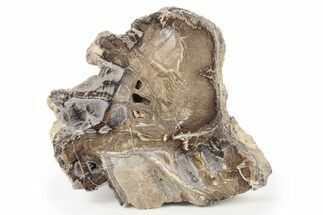This Specimen has been sold.
Colorful, 4.6" Polished Purple Cow Jasper - McDermitt, Oregon
This is a 4.6" tall, polished free-standing Purple Cow jasper specimen. This colorful jasper/agate was mined from McDermitt, Oregon and has been cut flat on one side and polished to a mirror-finish. What could be considered the base of this specimen has also been cut flat for presentation purposes.
Purple Cow jasper is the name for a colorful jasper-agate collected from a site in McDermitt, Oregon. It often features a mixture of red, purple, green, and yellow coloration, though a variety of additional colors are possible.
Jasper is a term that can be applied to an opaque variety of chalcedony (light does not pass through it). The opaqueness is due to a much larger amount of impurities mixed with silica/quartz. Like agate, it may form in a huge variety of colors, and is often multi-colored. In most cases, jasper will occur when silica-rich fluids permeate throughout a soft sediment or volcanic debris deposit. The fluids then crystallize around particles or impurities, resulting in a cementation process. Most often, the impurities present determine the coloration of the deposit following solidification, but other factors can play a role in the color of what is now considered a jasper.
Agate is a variety of microcrystalline quartz that displays translucence and, in some cases, banding. Agate primarily forms when silica-rich fluids fill pockets within rocks or fossils and deposit on open surfaces. This process can result in banding patterns as the composition and impurities of the fluids change over time. These banding patterns can either form as flat layers--known as waterline agate--or as rounded layers, depending on the surfaces available for deposition.
Jasper is a term that can be applied to an opaque variety of chalcedony (light does not pass through it). The opaqueness is due to a much larger amount of impurities mixed with silica/quartz. Like agate, it may form in a huge variety of colors, and is often multi-colored. In most cases, jasper will occur when silica-rich fluids permeate throughout a soft sediment or volcanic debris deposit. The fluids then crystallize around particles or impurities, resulting in a cementation process. Most often, the impurities present determine the coloration of the deposit following solidification, but other factors can play a role in the color of what is now considered a jasper.
Agate is a variety of microcrystalline quartz that displays translucence and, in some cases, banding. Agate primarily forms when silica-rich fluids fill pockets within rocks or fossils and deposit on open surfaces. This process can result in banding patterns as the composition and impurities of the fluids change over time. These banding patterns can either form as flat layers--known as waterline agate--or as rounded layers, depending on the surfaces available for deposition.
SPECIES
Chalcedony var. Jasper/Agate
LOCATION
McDermitt, Oregon
SIZE
4.6" tall, 2.7" wide
CATEGORY
SUB CATEGORY
ITEM
#152054
 Reviews
Reviews














